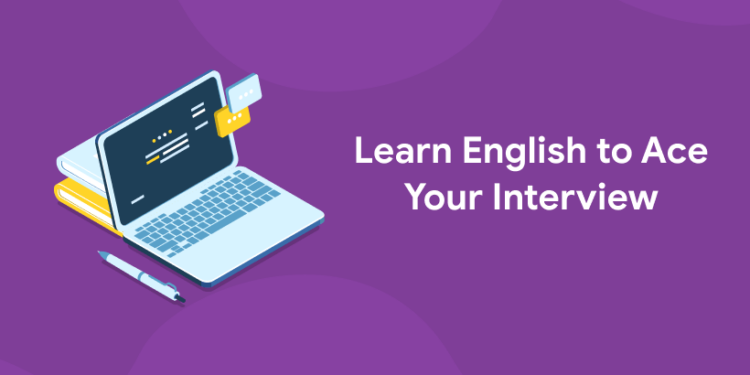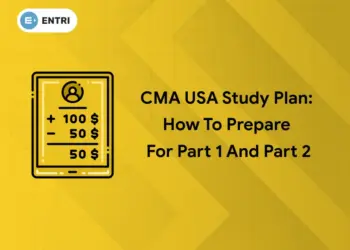Table of Contents
It’s never easy to interview for a new job. However, it is even more difficult if the interview is conducted in English rather than your native language. Take a look at the following recommendations to help you master an English job interview and how to learn English step by step.
Elevate your speaking skills with our Spoken English Course!
Learn English to Ace your Interview
Preparation is essential for interviewing in English since it helps you to feel confident in job interview conversation in English. Do some homework — learn about the company’s history and goals so you can anticipate the possible questions from the interviewer. They will usually ask questions to determine whether or not you’re a good fit for the role and the organization in general.
Tips for a Successful Job interview in English
1: Which of the sentences below is grammatically correct?
Follow the below given tip for success in interviews.
- Conduct your research: You must become acquainted with the industry, firm, and job for which you are interviewing. The company’s website is an excellent place to begin. This will provide you with some valuable talking points and prepare you for a few basic interview questions. Identify any challenging words or industry-specific inquiries that may arise in the week leading up to the interview.
- The most common English error made by non-native speakers is speaking in mixed tense. To keep your terminology consistent, discuss your job and experience in the past tense. Using the past tense is a convenient backup, and your interviewer is unlikely to notice or be distracted by it. (You may also make your resume easier to read by utilizing past tense verbs.)
- You may be asked a few questions during the interview that you do not understand. When this occurs, remember to ask, “May you express it another way?” so that the interviewer can swiftly reword the question. This is an excellent strategy for hearing familiar words while not interrupting the discussion. You might also ask the interviewer for a “synonym,” which is a term that sounds similar to the one you don’t know. For example, if you were asked about your “certifications” and didn’t grasp the term, your interviewer may substitute a synonym, such as “qualifications,” which you could understand better.
- Throughout the interview, remember to talk slowly and pronounce your sentences correctly. Pay close attention to the interviewer and do not hesitate to ask for clarification.
- You must be able to articulate how you handle challenges and achieve your objectives, which you may accomplish by highlighting success stories from your career. This might demonstrate your adaptability and ability to operate successfully in a range of scenarios. This strategy is especially useful if you are changing careers or lack relevant employment experience.
- Perfection can be attained only with constant practice. Arrange a mock interview with a friend, or if all else fails, practice your responses to frequently asked questions in front of a mirror. Not only will this provide you with an opportunity to improve your spoken English, but it will also allow you to become more comfortable discussing your relevant skills and accomplishments.
- It should go without saying, but arrive on time for your interview. If you rely on public transportation, plan an alternate route in case your bus or train is delayed. Also, bring an extra copy of your CV as well as a list of references.
- A hiring manager will be interested in knowing what abilities you will offer to their organization. Read the job description and build a list of the qualifications they are seeking for. Consider your relevant abilities and accomplishments, and prepare to discuss specific instances that show your professional strengths and fit for the role.
- When it comes to interviews, it’s critical to make a good first impression. What is the finest advice? Dress for the job you want. You’ll feel more secure if you know you’re well-groomed and your clothes are wrinkle-free and professional. It’s also crucial to feel at ease in whatever you’re wearing on the day of the interview; nothing is more distracting than an applicant fussing with their clothes or even their hair.
- In an interview, positivity goes a long way. A genuine smile may put everyone at ease and demonstrate to your interviewer that you’re genuinely excited about the job. Make eye contact and keep your body language as needed. Above all, resist the urge to make disparaging remarks about former employers.
- Taking the time to say a courteous thank you after an interview is a modest gesture that may go a long way. Consider sending a thank you email as a follow-up. This will keep you in the hiring manager’s mind and provide you with the perfect opportunity to reaffirm why you would be a fantastic match for the role.
Join our Spoken English program today and communicate with ease!
Spoken English Course for Guaranteed Confidence and Career Growth
Spoken English Course by Entri App: Enhance your communication skills, gain certification, and boost your career with confidence.
Join Now!A Few Frequently Asked Questions and Great Answers for Them
A few frequently asked questions are given below as an example:
- ” Please tell us something about yourself.” – Almost every interviewer will ask you this question. The goal of self-introduction in English for job interview is to keep your response pertinent. You don’t want to go into too much detail about your job history or exaggerate how much you adore your industry. The interviewer is most interested in you as a person. A suitable response might contain a brief explanation of related hobbies and interests, followed by how you got into your present industry, why you’re enthusiastic about it, and a brief mention of your most recent job history.
- “What are your main strengths and weaknesses?” – Interviewers frequently ask this question, so prepare a thoughtful response. It’s critical to remember to make a weakness appear to be a strength. ” My worst problem is that I’m a perfectionist who expects everything to be flawless.” you may remark. Is this, in fact, a negative statement? No, not at all. Whatever your flaws are, make them sound like strengths. Another effective technique is to discuss a problem (such as being unorganized) and provide some techniques for overcoming it: For example, I have developed a time-management system that allows me to list all of my responsibilities and arrange my deadlines so that I have a better understanding of what I need to complete.
- ” Could you tell me why you’re interested in this position?” During the interview, you will almost certainly be asked why you want this specific job or/and working for this particular firm – “Why are you interested in this position?” The answers to these questions should center on the motives that drove you to apply for the position. “Do you want to take on a new professional challenge?” for example. Do you desire a job that will provide you with the opportunity to advance? You could organize your responses based on your views.
- “Why should we hire you?”: In order to choose the greatest candidate, your future employer will want to know why you are the ideal person for the job and may ask you the question, “Why should we offer you the job?” This is perhaps the most crucial of the questions to focus on. To acquire the job, you must be able to provide a valid answer that persuades the interviewer that you are the best candidate.
- ” What kind of experience do you have?”: You will be questioned about your job experience, such as “Tell me about your professional background.” Similarly, the question could be about your academic accomplishments. You must be confident in your responses, but you must avoid seeming arrogant.
- “How do you envision yourself in five years?”: An employer is typically searching for someone who is ambitious and can solve any challenges that may emerge. As a result, you could be asked questions like, “Where do you see yourself in five years?” or “What are your professional objectives?” etc.
- “Can you tell me anything about our company?”: The interviewer asks this question to gauge your degree of interest in working for the organisation, as well as to assess the level of information you’ve gathered before applying. The responses do not have to be confined to simply repeating what is posted on their website but should demonstrate something more. Find out who your primary rivals are, what their marketing techniques are, or anything about their business culture.
- “How much money do you anticipate to make?”: Even salary-related queries like “How much do you anticipate to earn?”, will be part of the conversation, and they will undoubtedly represent a topic on which you will want additional information. Answer this question cleverly by asking about the work profile, possible salary range and other available benefits. Aim for an amount that may be considered reasonable. Make sure you have done your research on the typical income on the internet. Saying I’m not sure makes you appear uncertain. Be self-assured and set your price without undervaluing yourself (going for less) or overvaluing yourself (going for more). The fact is that they already have pay in mind, but this is their way of seeing if you’re familiar with the business and conscious of your abilities.
- “Is there anything more you’d want to talk about?” The interviewer may ask you if you have any questions or need any further information at some point throughout the interview like, “Is there anything more you’d want to discuss?” Don’t just say ‘no,’ since this might make you appear shallow and disinterested. Prepare some questions which could be related to chance for career growth, transfers etc.
- “What made you quit your previous job?” This question is not for you if you are applying for your first job. If you’ve previously worked, the interviewer will want to know why you left your previous employment. Were you let go because you were fired? (Your previous supervisor urged you to quit because you did something wrong.) Did you give up? (Did you choose to resign from your job?) Or were you let go? (Made redundant – no longer required because the job no longer exists?) If you have quit your previous employment, avoid expressing anything unpleasant about your previous employer or supervisor (even if this is true). The individual or people conducting the interview will just look at you negatively. You can answer this question by talking about having bigger aspirations or how you wanted to look for a job that is on par with your academic qualifications.
Join our Spoken English program today and communicate with ease!
Finally, have faith in your plan and hope for the best! Your dedication will be recognised and rewarded. While you may not be hired after your first interview, adopting these tactics will boost your chances of securing a job. Don’t give up and continue to apply for the jobs you desire. Download the Entri app to add good spoken English to your skill set and impress the interviewers with fluent speaking. Download the Entri app for attending online spoken English classes taken by best and most recommended tutors.









